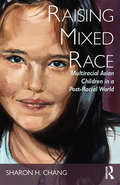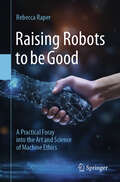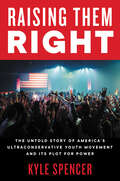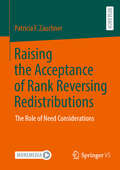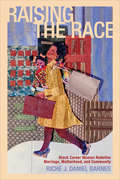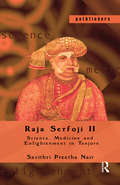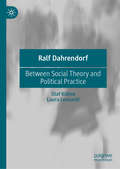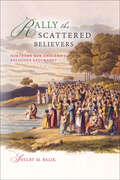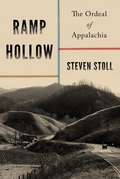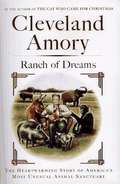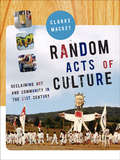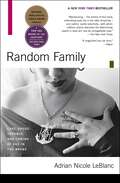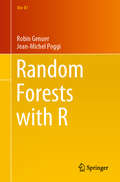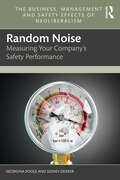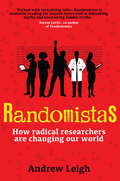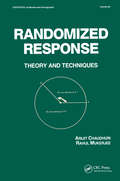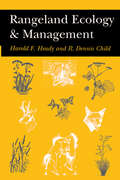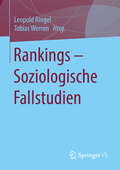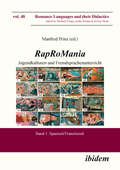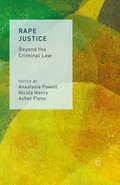- Table View
- List View
Raising Mixed Race: Multiracial Asian Children in a Post-Racial World
by Sharon H ChangResearch continues to uncover early childhood as a crucial time when we set the stage for who we will become. In the last decade, we have also seen a sudden massive shift in America’s racial makeup with the majority of the current under-5 age population being children of color. Asian and multiracial are the fastest growing self-identified groups in the United States. More than 2 million people indicated being mixed race Asian on the 2010 Census. Yet, young multiracial Asian children are vastly underrepresented in the literature on racial identity. Why? And what are these children learning about themselves in an era that tries to be ahistorical, believes the race problem has been “solved,” and that mixed race people are proof of it? This book is drawn from extensive research and interviews with sixty-eight parents of multiracial children. It is the first to examine the complex task of supporting our youngest around being “two or more races” and Asian while living amongst “post-racial” ideologies.
Raising Robots to be Good: A Practical Foray into the Art and Science of Machine Ethics
by Rebecca RaperIn 1941 Isaac Asimov famously introduced us to the idea of Robots with the ability to tell between right and wrong. However, as his stories go on to show, the ‘Laws of Robotics’ weren’t quite able to govern robots in a way that we would deem acceptable for humanity. In recent years, scientists have worked to try to understand how we might create robots with this capability – robots with morals – and as Robots and Artificial Intelligence Systems become more integrated into society and our lives, it seems that achieving this aim is as pertinent as ever. This book introduces this pursuit, known as Machine Ethics, and aims to outline some of the art and science behind the field – including the philosophy, psychology and computer science that underpins much of the research into this area. After the necessary background, and an exploration of the problem, a new theory is proposed inspired how we might envisage moral agency developing in a child. The proposal is that we need to cultivate moral development in a robot, in pretty much the same way we might parent a child: Raising Robots to be Good.
Raising Them Right: The Untold Story of America's Ultraconservative Youth Movement and Its Plot for Power
by Kyle SpencerA riveting behind-the-scenes account of the new stars of the far right—and how they’ve partnered with billionaire donors, idealogues, and political insiders to build the most powerful youth movement the American right has ever seen In the wake of the Obama presidency, a group of young charismatic conservatives catapulted onto the American political and cultural scenes, eager to thwart nationwide pushes for greater equity and inclusion. They dreamed of a cultural revolution—online and off—that would offer a forceful alternative to the progressive politics that were dominating American college campuses. In Raising Them Right, a gripping, character-driven read and investigative tour de force, Kyle Spencer chronicles the people and organizations working to lure millions of unsuspecting young American voters into the far-right fold—revealing their highly successful efforts to harness social media in alarming ways and capitalize on the democratization of celebrity culture.These power-hungry new faces may look and sound like antiestablishment renegades, but they are actually part of a tightly organized and heavily funded ultraconservative initiative to transform American youth culture and popularize fringe ideas. There is Charlie Kirk, the swashbuckling Trump insider and founder of the right-wing youth activist group Turning Point USA, who dreams of taking back the country’s soul from weak-kneed liberals and becoming a national powerbroker in his own right. There is the acid-tongued Candace Owens, a Black ultraconservative talk-show host and Fox News regular who is seeking to bring Black America to the GOP and her own celebritydom into the national forefront. And there is the young, rough-and-tumble libertarian Cliff Maloney, who built the Koch-affiliated organization Young Americans for Liberty into a political force to be reckoned with, while solidifying his own power and pull inside conservative circles.Chock-full of original reporting and unprecedented access, Raising Them Right is a striking prism through which to view the extraordinary shifts that have taken place in the American political sphere over the last decade. It establishes Kyle Spencer as the premier authority on a new generation of young conservative communicators who are merging politics and pop culture, social media and social lives, to bring cruel economic philosophies, skeletal government, and dangerous antidemocratic ideals into the mainstream. Theirs is a crusade that is just beginning.
Raising the Acceptance of Rank Reversing Redistributions: The Role of Need Considerations
by Patricia F. ZauchnerRedistribution is a major objective of welfare states. In certain cases, redistribution not only reduces the financial differences between some individuals or groups but also changes their positions in a financial ranking. Prior studies have indicated that such rank reversals can reduce support for redistribution. This book addresses this issue by arguing that if redistribution is aimed at meeting needs rather than promoting equality, the negative effect of rank reversals on the acceptance of redistribution can be reduced. The argument is first supported by a theoretical exploration, which, among others, endeavors to incorporate a no-reranking principle into the well-established list of distributive justice principles. It shows that although individuals may apply the no-reranking principle, the principle is normatively weak, especially compared to the need principle. The argument is further supported by evidence from an online third-party dictator game in which each decision-maker had to redistribute money between two other participants. It varied whether those participants were above or below a specific needs threshold and whether a transfer would reverse ranks or not. The results showed that when redistribution was required to satisfy the poorer person’s needs, the negative effect of rank reversals on the acceptance of redistribution almost vanished.
Raising the Race: Black Career Women Redefine Marriage, Motherhood, and Community
by Professor Riché J. BarnesPopular discussions of professional women often dwell on the conflicts faced by the woman who attempts to "have it all," raising children while climbing up the corporate ladder. Yet for all the articles and books written on this subject, there has been little work that focuses on the experience of African American professional women or asks how their perspectives on work-family balance might be unique. Raising the Race is the first scholarly book to examine how black, married career women juggle their relationships with their extended and nuclear families, the expectations of the black community, and their desires to raise healthy, independent children. Drawing from extensive interviews with twenty-three Atlanta-based professional women who left or modified careers as attorneys, physicians, executives, and administrators, anthropologist Riché J. Daniel Barnes found that their decisions were deeply rooted in an awareness of black women's historical struggles. Departing from the possessive individualistic discourse of "having it all," the women profiled here think beyond their own situation--considering ways their decisions might help the entire black community. Giving a voice to women whose perspectives have been underrepresented in debates about work-family balance, Barnes's profiles enable us to perceive these women as fully fledged individuals, each with her own concerns and priorities. Yet Barnes is also able to locate many common themes from these black women's experiences, and uses them to propose policy initiatives that would improve the work and family lives of all Americans.
Raising the World: Child Welfare in the American Century
by Sara FieldstonAfter World War II, American organizations launched efforts to improve the lives of foreign children, from war orphans in Europe and Japan to impoverished youth in the developing world. Providing material aid, education, and emotional support, these programs had a deep humanitarian underpinning.<P><P> But they were also political projects. Sara Fieldston’s comprehensive account Raising the World shows that the influence of child welfare agencies around the globe contributed to the United States’ expanding hegemony. These organizations filtered American power through the prism of familial love and shaped perceptions of the United States as the benevolent parent in a family of nations.
Raja Serfoji II: Science, Medicine and Enlightenment in Tanjore (Pathfinders)
by Savithri Preetha NairIn the early nineteenth century, the south Indian kingdom of Tanjore, which had come under the control of the East India Company, flourished as a ‘centre’ of enlightenment. This book traces the contours of the Tanjore enlightenment, which produced a knowledge that was at once modern and deeply rooted in the indigenous tradition. The chief protagonist of this first ever full-length study on Tanjore at the turn of the nineteenth century is Raja Serfoji II (r. 1798–1832), in whose world science and God coexisted comfortably. Tanjore at this time was a thriving contact-zone, linked to several centres through extensive local and global networks. Its court attracted a great number of visitors, including Christian missionaries, high-ranking Company officials, princely contemporaries, naturalists, and medical practitioners. Dwelling on the locatedness of science and enlightenment modernity in the context of the colonial periphery, the book describes how the Raja deployed certain ‘vectors of assemblage’ — an array of practices, instruments, theories and people, including his vast collection of manuscripts, books and scientific instruments, a Devanagari printing press, a menagerie, health establishments and a large retinue of trained experts and artists — to invent Tanjore as a contemporary ‘centre’. Shunning reductionist and diffusionist explanations of the transmission of Western science in colonial settings, the study uses hitherto unexplored archival sources to reconstruct the Tanjore enlightenment as the outcome of globally situated cross-cultural exchanges. It celebrates the openness and confidence with which European science was engaged with, assimilated, translated and reinvented in a ‘contact-zone’ located in the colonial backwaters of south India. The book will be of interest to historians, sociologists and those interested in history of science and medicine, anthropologists, cultural studies scholars, as well as the general reader.
Ralf Dahrendorf: Between Social Theory and Political Practice
by Olaf Kühne Laura LeonardiRalf Dahrendorf (1929 to 2009) has worked in sociology, political practice and political philosophy, and is associated with significant impulses in role theory and conflict theory. This book presents the first synthesis of his extensive oeuvre in English. Dahrendorf's political commitment was driven largely by his desire to maximize life chances, thus contributing to the further development of liberalism. In the tradition of Karl Popper, his work in all areas was aimed at defending the open society, and he saw conflicts, if they were settled, as being suitable in principle for contributing to social progress. This book provides insights into the various methodological and theoretical aspects and critiques of Ralf Dahrendorf's work, as well as his reflections on the position of sociology in the system of sciences and in relation to political practice. The current crisis of liberal politics has made Dahrendorf’s work more relevant than ever, and this overview will be of great interest to students and researchers across sociology, political science, political ideologies and European integration.
Rally the Scattered Believers: Northern New England's Religious Geography
by Shelby M. Balik“An important new interpretation of how religious change shaped American cultural identity in the early republic.” —Journal of American HistoryNorthern New England, a rugged landscape dotted with transient settlements, posed challenges to the traditional town church in the wake of the American Revolution. Using the methods of spatial geography, Shelby M. Balik examines how migrants adapted their understanding of religious community and spiritual space to survive in the harsh physical surroundings of the region. The notions of boundaries, place, and identity they developed became the basis for spreading New England’s deeply rooted spiritual culture, even as it opened the way to a new evangelical age.“I strongly recommend Balik’s book for those studying colonial religious landscapes and heritages not only in New England, but in the nineteenth-century religious diasporas that swept the continent with varying mixes of European colonials and also African and Asian heritages.” —Stanley D. Brunn, University of Kentucky“In this beautifully written and richly researched work, Shelby Balik shows how the travels of early nineteenth century Methodists, Universalists and freewill Baptist itinerant missionaries and congregations recreated the geography of New England Protestantism, setting in motion (literally) a tension between religious rootedness and religious uprootedness, center and periphery, that endures to today. Early American religious history in Balik’s retelling of it is one of bodies in constant movement in and out and around the city on the hill. The delight Balik takes in maps and journeys is infectious. This is a wonderful addition to American religious historiography.” —Robert Orsi, Northwestern University
Ralph Edwards: The Inside Story of a Worldwide Quest for Safer Medicines (Springer Biographies)
by Ian HembrowMedical treatments designed to help people can also be harmful or fatal. Around 2.5 million people die this way each year. So if any kind of medicine makes someone unwell, they or their doctor should report it. Those reports, from nearly every country in the world, go to the Uppsala Monitoring Centre (UMC) in Sweden. As the Centre’s first director, Professor Ivor Ralph Edwards transformed it from a tiny operation with limited horizons into an internationally acclaimed scientific organization at the heart of the World Health Organization’s Programme for International Drug Monitoring. He was then succeeded by his wife, Dr Marie Lindquist.This is the story of how a new science developed and a passionate and dedicated pursuit of worldwide medicines safety, with an unerring focus on the welfare of patients. The pioneering work of Ralph, Marie and their collaborators on every continent protected the lives of millions of people. It may yet improve the lives of billions more.
Rammsteins „Deutschland“: Pop – Politik – Provokation (Essays zur Gegenwartsästhetik)
by Thomas Ernst Melanie Schiller Christoph Jürgensen Moritz Baßler Lea Espinoza Garrido Kerstin Wilhelms Immanuel Nover Eva Stubenrauch Anna Seidel Matthias Schaffrick Jan-Peter HerbstRammstein provozieren. In ihren Songs und Musikvideos spielt die Band mit Doppeldeutigkeiten rund um die deutsche Geschichte und testet die Grenzen des Sag- und Singbaren. Besonders deutlich wird das in ihrer Single „Deutschland“, einer (Anti?)Hymne auf die Nation. Im cineastisch-bombastischen Musikvideo präsentieren sich die Bandmitglieder unter anderem als KZ-Insassen und SS-Offiziere. Alles nur Spektakel? Oder doch politisch? Das Verhältnis von Politik und Pop zeigt sich bei Rammstein in seinen verschiedenen Dimensionen.
Ramp Hollow: The Ordeal of Appalachia
by Steven Stoll<p>In Ramp Hollow, Steven Stoll offers a fresh, provocative account of Appalachia, and why it matters. He begins with the earliest European settlers, whose desire for vast forests to hunt in was frustrated by absentee owners―including George Washington and other founders―who laid claim to the region. Even as Daniel Boone became famous as a backwoods hunter and guide, the economy he represented was already in peril. Within just a few decades, Appalachian hunters and farmers went from pioneers to pariahs, from heroes to hillbillies, in the national imagination, and the area was locked into an enduring association with poverty and backwardness. Stoll traces these developments with empathy and precision, examining crucial episodes such as the Whiskey Rebellion, the founding of West Virginia, and the arrival of timber and coal companies that set off a devastating “scramble for Appalachia.” <p>At the center of Ramp Hollow is Stoll’s sensitive portrayal of Appalachian homesteads. Perched upon ridges and tucked into hollows, they combined small-scale farming and gardening with expansive foraging and hunting, along with distilling and trading, to achieve self-sufficiency and resist the dependence on cash and credit arising elsewhere in the United States. But the industrialization of the mountains shattered the ecological balance that sustained the households. Ramp Hollow recasts the story of Appalachia as a complex struggle between mountaineers and profit-seeking forces from outside the region. Drawing powerful connections between Appalachia and other agrarian societies around the world, Stoll demonstrates the vitality of a peasant way of life that mixes farming with commerce but is not dominated by a market mind-set. His original investigation, ranging widely from history to literature, art, and economics, questions our assumptions about progress and development, and exposes the devastating legacy of dispossession and its repercussions today.</p>
Ranch of Dreams: The Heartwarming Story of America's Most Unusual Animal Sanctuary
by Cleveland AmoryAfter reading Black Beauty as a child, Cleveland Amory dreamed that some day he would have a ranch where animals would not be abused, but instead would, like the famous horse, end their days roaming proud and free. Many people know that Amory has worked tirelessly for decades on behalf of animals: the founder of the Fund for Animals in 1967, he first confessed to being adopted by a stray cat himself in The Cat Who Came for Christmas, the best-selling cat book of all time. But few know that Amory did in fact realize his childhood ambition by establishing the Black Beauty Ranch in East Texas. Now he shares, in his all-but-patented combination of humor and warmth, the remarkable stories of these rescues. Over the years, countless animals who have been mistreated or simply found “inconvenient” have been saved from death’s door at this unique sanctuary. Wild burros from the Grand Canyon have been saved from massacre. Goats from San Clemente Island have been delivered from the sights of U.S. Navy guns. Nim the “talking” chimpanzee, perhaps the most famous animal in the country, was rescued from a laboratory. Creatures great and small, from elephants and buffalo to prairie dogs and, yes, cats, have found their haven at the ranch, where they can live out their lives with dignity, knowing, as the last line of Blacky Beauty puts it, “My troubles are all over, and I am at home.” At times heartbreaking, at times hilarious, always moving and engrossing. Ranch of Dreams is sure to capture the hearts and minds of Amory’s countless readers.
Random Acts of Culture: Reclaiming Art and Community in the 21st Century
by Clarke MackeyIn our society, cultural activity—or the arts—usually refers to the high culture of the elites and popular mass culture. Clarke Mackey argues for a third category that is as old as human society itself but seldom discussed: vernacular culture. Vernacular culture comprises all those creative, non-instrumental activities that people engage in daily, activities that provide meaning in life: conversations between friends, social gatherings and rituals, play and participatory sports, informal storytelling, musical jam sessions, cooking and gardening, homemade architecture, and street festivals. In this lively and eclectic discussion, Mackey maintains that practising and celebrating such activities at the expense of passive, consumer culture have far-reaching benefits. Mackey further examines how literacy, imperialism, industrialization and electronic technologies have produced a culture of spectatorship, apathy and powerlessness. This is a timely, considered, and provocative response to the popularity of amateur, participatory, and do-it-yourself culture available on the internet.
Random Family: Love, Drugs, Trouble, and Coming of Age in the Bronx
by Adrian Nicole Leblanc<P>Random Family tells the American outlaw saga lurking behind the headlines of gangsta glamour, gold-drenched drug dealers, and street-corner society. <P>With an immediacy made possible only after ten years of reporting, Adrian Nicole LeBlanc immerses the reader in the mind-boggling intricacies of the little-known ghetto world. She charts the tumultuous cycle of the generations, as girls become mothers, mothers become grandmothers, boys become criminals, and hope struggles against deprivation. <P>Two romances thread through Random Family: the sexually charismatic nineteen-year-old Jessica's dizzying infatuation with a hugely successful young heroin dealer, Boy George, and fourteen-year-old Coco's first love with Jessica's little brother, Cesar, an aspiring thug. <P>Fleeing from family problems, the young couples try to outrun their destinies. Chauffeurs whisk them to getaways in the Poconos and to nightclubs. They cruise the streets in Lamborghinis and customized James Bond cars. <P>Jessica and Boy George ride the wild adventure between riches and ruin, while Coco and Cesar stick closer to the street, all four caught in a precarious dance between life and death. <P>Friends get murdered; the DEA and FBI investigate Boy George's business activities; Cesar becomes a fugitive; Jessica and Coco endure homelessness, betrayal, the heartbreaking separation of prison, and throughout it all, the insidious damage of poverty. <P>Together, then apart, the teenagers make family where they find it. Girls look for excitement and find trouble; boys, searching for adventure, join crews and prison gangs. Coco moves upstate to dodge the hazards of the Bronx; Jessica seeks solace in romance. Both find that love is the only place to go. <P>A gifted prose stylist and a profoundly compassionate observer, Adrian Nicole LeBlanc has slipped behind the cold statistics and sensationalism surrounding inner-city life and come back with a riveting, haunting, and true urban soap opera that reveals the clenched grip of the streets. <P>Random Family is a compulsive read and an important journalistic achievement, sure to take its place beside the classics of the genre.
Random Forests with R (Use R!)
by Jean-Michel Poggi Robin GenuerThis book offers an application-oriented guide to random forests: a statistical learning method extensively used in many fields of application, thanks to its excellent predictive performance, but also to its flexibility, which places few restrictions on the nature of the data used. Indeed, random forests can be adapted to both supervised classification problems and regression problems. In addition, they allow us to consider qualitative and quantitative explanatory variables together, without pre-processing. Moreover, they can be used to process standard data for which the number of observations is higher than the number of variables, while also performing very well in the high dimensional case, where the number of variables is quite large in comparison to the number of observations. Consequently, they are now among the preferred methods in the toolbox of statisticians and data scientists. The book is primarily intended for students in academic fields such as statistical education, but also for practitioners in statistics and machine learning. A scientific undergraduate degree is quite sufficient to take full advantage of the concepts, methods, and tools discussed. In terms of computer science skills, little background knowledge is required, though an introduction to the R language is recommended. Random forests are part of the family of tree-based methods; accordingly, after an introductory chapter, Chapter 2 presents CART trees. The next three chapters are devoted to random forests. They focus on their presentation (Chapter 3), on the variable importance tool (Chapter 4), and on the variable selection problem (Chapter 5), respectively. After discussing the concepts and methods, we illustrate their implementation on a running example. Then, various complements are provided before examining additional examples. Throughout the book, each result is given together with the code (in R) that can be used to reproduce it. Thus, the book offers readers essential information and concepts, together with examples and the software tools needed to analyse data using random forests.
Random Noise: Measuring Your Company's Safety Performance (The Business, Management and Safety Effects of Neoliberalism)
by Sidney Dekker Georgina PooleIn the realm of safety management, this book embarks on a profound exploration of how the political economy was reshaped in the last two decades. Much like privatization, deregulation, and financialization altered the economic landscape, this narrative unveils how safety management has been affected by the intertwined dynamics of asset underinvestment, privatization, self-regulation, workplace flexibilization, and market-driven policies.This book, the second installment of a thought-provoking trilogy on the consequences of neoliberalism, mirrors the political economy's promotion of the private sector's role in the economy. Just as neoliberalism amplified and accelerated the mechanisms of human-made disasters in complex systems, this narrative lays bare the heightened potential for safety misfortunes when governed by market-driven principles.As the story unfolds, the book delves into the concept of 'synoptic legibility' in safety management, akin to how the political economy distilled its essence into privatization and deregulation. The authors scrutinize the consequences of translating safety measures into rigid targets, unveiling how this shift can distort the integrity of safety metrics and inadvertently harm individuals. Drawing parallels with historical blunders such as England's window tax, the book contemplates the precarious nature of equating simplified metrics with safety achievements. Much like the political economy's 'acceptable risk' renegotiations, it examines how the pursuit of safety through metrics and surveillance can lead to 'manufactured insecurity,' eroding trust, autonomy, and professionalism.In Random Noise, Poole and Dekker extend this reach once again, writing for all managers, board members, organization leaders, consultants, practitioners, researchers, lecturers, students, and investigators curious to understand the genuine nature of organizational and safety performance.
Randomistas: How Radical Researchers Are Changing Our World
by Andrew LeighA fascinating account of how radical researchers have used experiments to overturn conventional wisdom and shaped life as we know itExperiments have consistently been used in the hard sciences, but in recent decades social scientists have adopted the practice. Randomized trials have been used to design policies to increase educational attainment, lower crime rates, elevate employment rates, and improve living standards among the poor.This book tells the stories of radical researchers who have used experiments to overturn conventional wisdom. From finding the cure for scurvy to discovering what policies really improve literacy rates, Leigh shows how randomistas have shaped life as we know it. Written in a &“Gladwell-esque&” style, this book provides a fascinating account of key randomized control trial studies from across the globe and the challenges that randomistas have faced in getting their studies accepted and their findings implemented. In telling these stories, Leigh draws out key lessons learned and shows the most effective way to conduct these trials.
Randomized Controlled Trials in Evidence-Based Dentistry
by Richie Kohli Harjit S. Sehgal Peter MilgromThis book reviews the role of randomized controlled trials (RCTs) in clinical dentistry, explains how to successfully conduct RCTs related to dentistry, and provides detailed information on the use of RCTs within each of the dental specialties. Although RCTs represent the gold standard in evidence-based dentistry for evaluation of the effects of an intervention, a textbook on the subject has to date been lacking. Randomized Controlled Trials in Evidence-Based Dentistry will fill this educational gap and improve the confidence of dental providers, researchers, and their multidisciplinary teams in conducting high-quality RCTs in a variety of settings and different parts of the world. In particular, it will enable readers to implement a suitable step-by-step approach to RCTs, identify possible solutions to common challenges when performing RCTs in individual dental specialties, and apply these solutions to their own RCT projects.
Randomized Response: Theory and Techniques (Statistics: A Series Of Textbooks And Monographs #Volume 34)
by Arijit Chaudhuri Rahul MukerjeeOffering a concise account of the most appropriate and efficient procedures for analyzing data from queries dealing with sensitive and confidential issues- including the first book-length treatment of infinite and finite population set-ups - this volume begins with the simplest problems, complete with their properties and solutions, and proceeds to incrementally more difficult topics. Randomized Response is mandatory reading for statisticians and biostatisticians, market researchers, operations researchers, pollsters, sociologists, political scientists, economists and advanced undergraduate and graduate students in these areas.
Rangeland Ecology And Management
by Harold HeadyThe science of range management, like many other resource disciplines, has embraced and integrated environmental concerns in the field, the laboratory, and policy. Rangeland Ecology and Management now brings this integrated approach to the classroom in a thoroughly researched, comprehensive, and readable text. The authors discuss the basics of ran
Rankings – Soziologische Fallstudien
by Leopold Ringel Tobias WerronRankings sind in der modernen Gesellschaft allgegenwärtig: Athleten, Hotels, Nationalstaaten, Unternehmen, Universitäten, Kunsttreibende und viele andere sehen sich Leistungsvergleichen in der Form von regelmäßig veröffentlichen Ranglisten ausgesetzt. Die Beiträge des Sammelbandes nähern sich dem Phänomen aus einer genuin soziologischen Perspektive und untersuchen u.a. die Produktion, Verwendungsweisen, Institutionalisierung und Effekte von Rankings in unterschiedlichen gesellschaftlichen Feldern.
Rap RoMania: Band 1: Spanisch/Französisch (Romance Languages and Their Didactics #48)
by Manfred PrinzHip-hop and rap music have been a central part of youth cultures all around the world for decades. While every country has its own scene with a specific social and cultural context, the global hip-hop phenomenon also allows young people to integrate their regional identities within an increasingly international environment. The inclusion of rap and hip-hop lyrics in foreign language teaching makes a unique, transcultural approach possible that connects directly to the students' interests.This guidebook offers both teachers and students a wealth of authentic rap and hip-hop lyrics that can be used in Spanish and French as foreign-language classes. They can serve as exercises for listening and reading comprehension of all levels or as templates for entire teaching units. The accompanying website (www.rapromania.de) lends itself to the integration in various forms of multimedia teaching and learning.
Rape Justice: Beyond the Criminal Law (Interventions Ser.)
by Asher Flynn Nicola Henry Anastasia PowellThis book explores the burgeoning interest in alternative and innovative justice responses to sexual violence both within and outside the legal system. It explores the limits of criminal law for achieving 'rape justice' and highlights possibilities for expanding how we think about justice in the aftermath of sexual violence.
Rape New York
by Jana LeoIn the gripping first pages of this true story, Jana Leo relives the moment-by-moment experience of a home invasion and rape in her own apartment in Harlem. After she reports the crime, she waits. Between police disinterest and squabbles from the health insurance company over who's going to pay for the rape kit, she realizes that the violence of such an experience does not stop with the crime. Increasingly concerned that the rapist will return (to harm her or other women in the building), she seeks help from her landlord, who refuses to address security issues on the property. She comes to understand that it is precisely these conditions of newly gentrified lower-income areas which lead to vulnerable living spaces, high turnover rates, and ultimately higher profits for these slumlords. In this most singular memoir, Leo weaves a psychological journey into an analysis that becomes equally personal: the fault lines of property mismanagement, class vulnerabilities, and a deeply flawed criminal justice system. In a stunning conclusion, Leo has her day in court.Jana Leo taught at Cooper Union for seven years and now divides her time between Madrid and New York. In 2007 she founded Civic Gaps, a New York think tank dedicated to studying empty or neglected spaces in the city.
